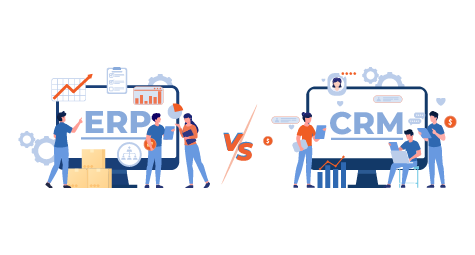ERP vs. CRM: Understanding the Difference and Which Your Business Needs

Differences Between ERP and CRM
ERP systems are powerful tools that integrate and manage the core functions of a business, such as finance, supply chain, human resources, and production. Their primary objective is to streamline internal processes, enhance efficiency, and provide a single, unified view of the organization's operations. By automating and connecting various business processes, ERP systems enable seamless cooperation between departments, leading to improved resource management and decision-making.
CRM systems, in contrast, focus on managing a company’s interactions with current and potential customers. Their primary goal is to enhance customer relationships, drive sales, and improve customer service. CRM systems track customer data, manage sales pipelines, and provide insights into customer behavior and preferences, allowing businesses to tailor their marketing efforts, retain customers, and ultimately boost revenue. Unlike ERP systems, which aim to enhance internal efficiency, CRM systems are geared towards optimizing customer-facing activities and building strong, lasting customer relationships.
When to Choose ERP Over CRM:
Selecting an ERP system over a CRM system is more beneficial in various situations where a comprehensive, all-inclusive internal management system is essential:
Complex Supply Chain Management: When it comes to managing a complex supply chain with intricate operations such as inventory management, procurement, and logistics, ERP systems provide the comprehensive solution to streamline these processes.
Integrated Financial Management: Businesses that require in-depth financial oversight, such as budgeting, accounting, and compliance, can benefit from the robust financial modules offered by ERP systems, which seamlessly integrate with other business processes.
Manufacturing Operations: ERP systems provide an ideal solution for businesses in manufacturing with their capabilities to effectively manage production schedules, track work orders, and optimize resource allocation.
Human Resources Management: Businesses requiring a comprehensive solution for their human resource management needs, such as payroll, employee benefits, and performance management, can explore the integrated HR modules in ERP systems to streamline and manage these critical functions.
Project Management: With their advanced project management features, such as resource planning, task tracking, and budget management, ERP systems offer a powerful solution for organizations that require efficient handling of large-scale and complex projects.
Regulatory Compliance: For businesses operating in regulated industries, ERP systems provide valuable support with their integrated reporting and auditing features, ensuring compliance with industry standards and regulations.
Data Integration: By consolidating data from different departments into a single platform, ERP systems create a unified source of truth for businesses, ensuring data accuracy and accessibility, while enhancing overall efficiency and decision-making.
In these scenarios, an ERP system's ability to integrate and streamline various internal processes makes it a more suitable choice compared to a CRM system, which focuses primarily on customer interactions and sales management.
When to Choose CRM Over ERP:
When customer engagement, sales pipeline management, and personalized marketing are key business goals, choosing a CRM system can be more effective than an ERP system. Here are some situations where this may be the case:
Customer Relationship Management: For businesses that prioritize building and maintaining strong customer relationships, CRM systems offer the best solution by tracking customer interactions, managing leads, and providing personalized service that fosters long-term engagement.
Sales Growth: When the objective is to increase sales, CRM systems provide the necessary tools for managing the entire sales process, monitoring performance, analyzing customer data, and identifying new opportunities to optimize sales strategies and maximize revenue.
Marketing Automation: CRM systems automate and manage marketing campaigns, segment customer lists, and by tracking campaign effectiveness, CRM systems help businesses optimize their marketing efforts to target the right customers with the right content at the right time, maximizing the impact of their marketing strategies.
Customer Support: For businesses looking to enhance customer service, CRM systems offer tools for managing support tickets, tracking customer issues, and ensuring timely resolutions. This helps businesses offer exceptional customer service, leading to higher customer satisfaction and long-term loyalty.
Customer Insights: By providing valuable insights into customer behavior and preferences, CRM systems enable businesses to tailor their products and services to better meet customer needs, ensuring a personalized and satisfying customer experience that drives long-term loyalty and revenue.
In these scenarios, a CRM system’s capabilities in managing customer interactions and sales activities make it a more suitable choice compared to an ERP system, which focuses on internal business processes.
Why Does Your Business Need an ERP or CRM System?
Implementing an ERP or CRM system helps businesses improve efficiency, make better decisions, and drive growth. An ERP system integrates various internal functions like finance, supply chain, and human resources into a single platform, making it easier to manage operations, access data, and make informed decisions. On the other hand, a CRM system helps businesses manage customer interactions, improve customer relationships, and increase sales by offering personalized service and targeted marketing. Both systems automate routine tasks, allowing employees to focus on strategic initiatives. They support business growth by scaling with demand and ensuring compliance with regulations.
Most Asked FAQs
1. Why should my business invest in ERP?
An ERP system helps improve efficiency by integrating various business processes, reducing operational costs, and providing real-time insights into performance and data management.
2. Can ERP and CRM systems work together?
Yes, integrating ERP and CRM systems can provide a comprehensive view of your business operations and customer interactions, leading to better decision-making and efficiency.
3. How can Snetzweb help with ERP and CRM systems?
Snetzweb provides expert development and implementation services for both ERP and CRM systems, ensuring that your business gets tailored solutions that meet your specific needs and drive growth.
4. What are the typical expenses involved in ERP and CRM systems?
Costs can include software licensing, customization, training, and ongoing maintenance. When investing in any system, consider both initial and long-term costs. Snetzweb can offer cost-effective solutions tailored to your budget.


